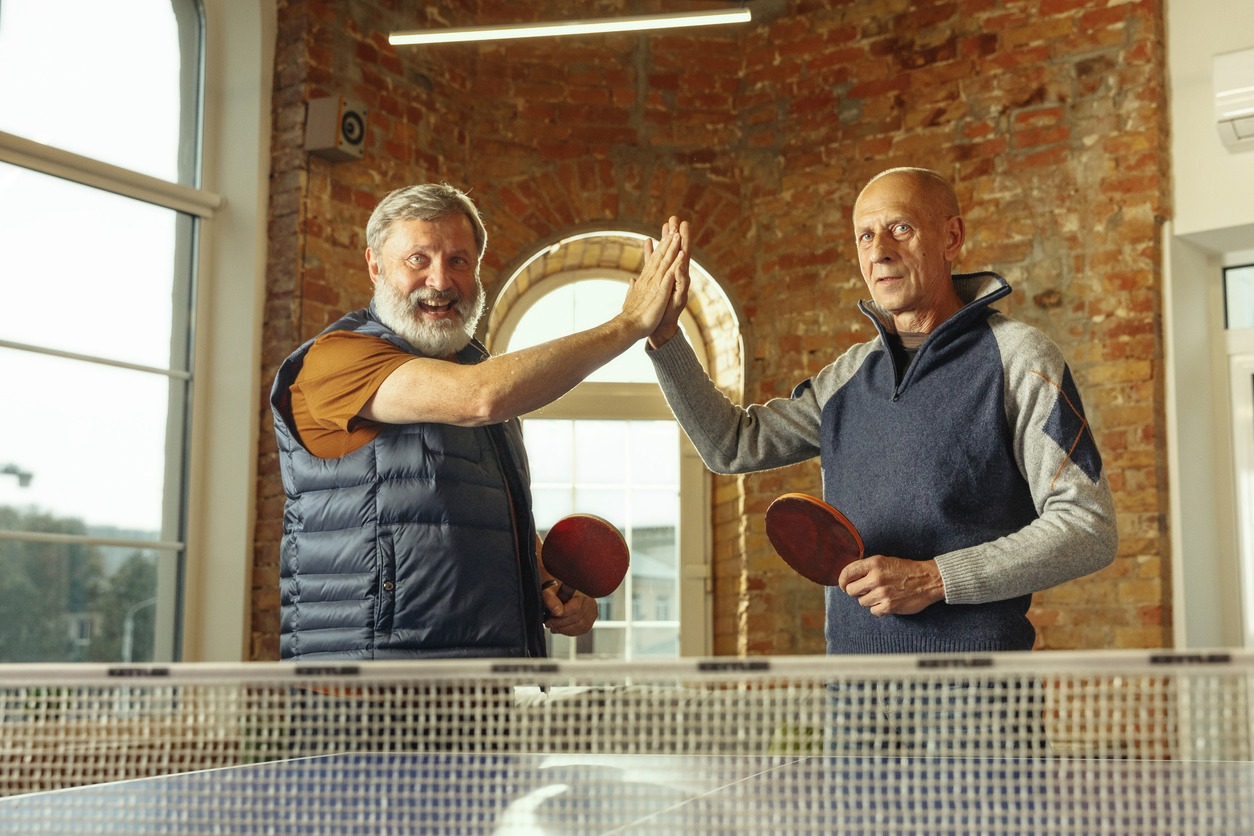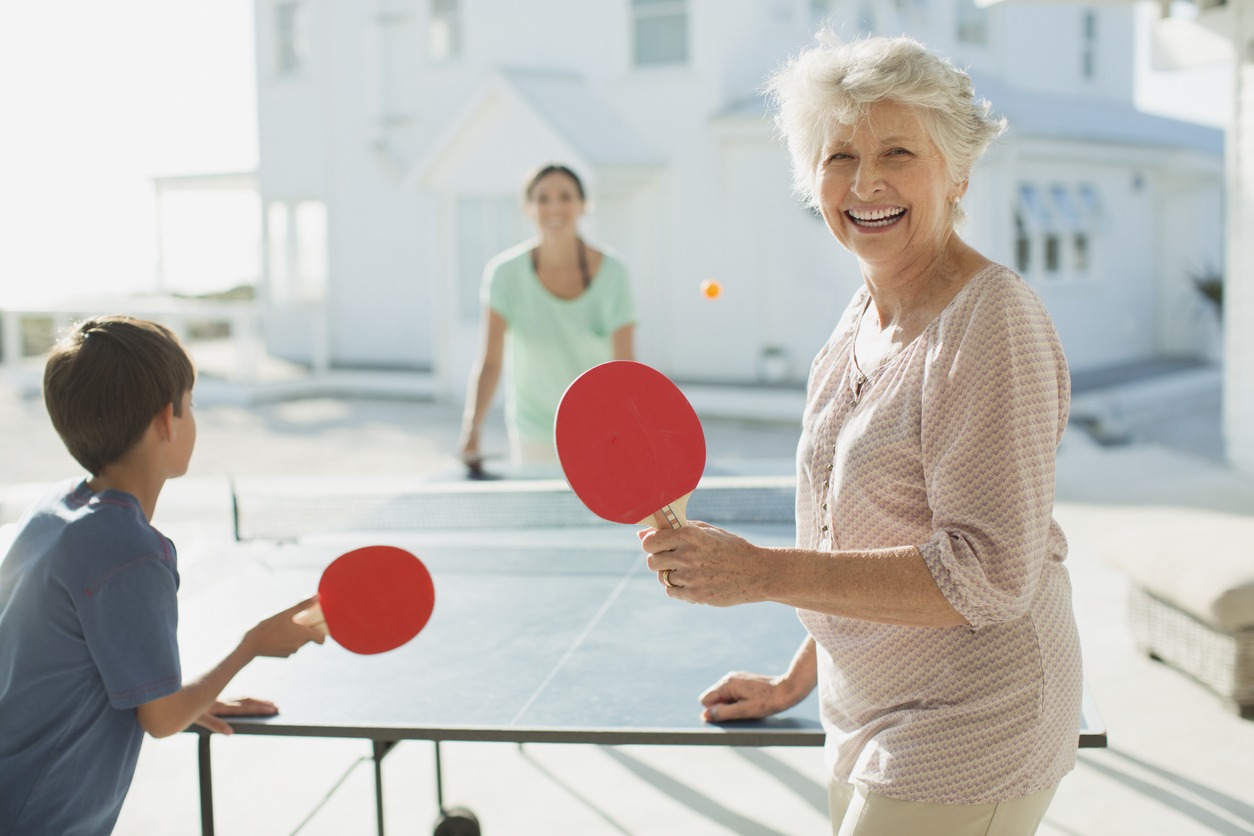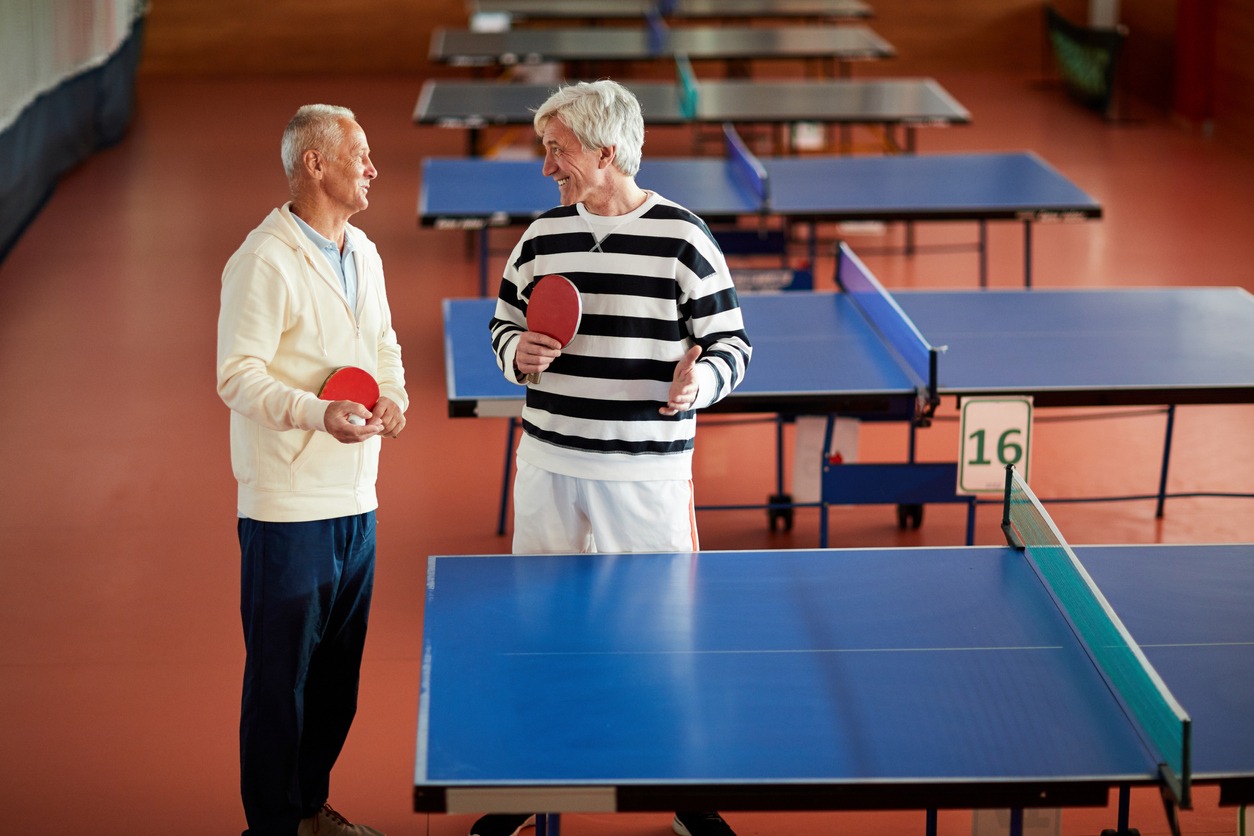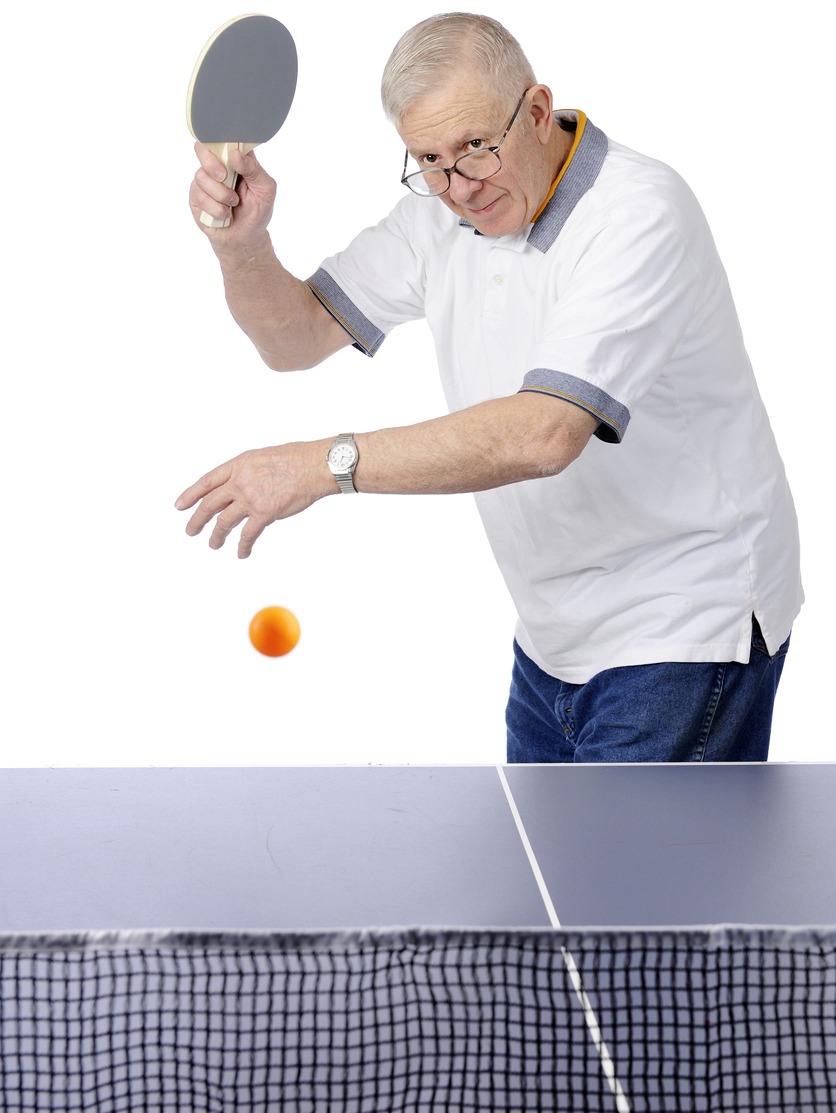As we get older, it becomes more crucial to keep our bodies and minds active. One often overlooked and enjoyable way for seniors to achieve this is by playing ping pong.
Ping pong, often known as table tennis, is a widely popular sport enjoyed worldwide. What makes it particularly appealing is that it doesn’t require expensive equipment, special facilities, or physical contact among players.
People usually think of ping pong as a game for young folks, not realizing that it’s actually a competitive sport in many parts of the world. Plus, the pace of play can be adjusted to accommodate individuals of all skill levels, ages, and abilities, especially seniors.
In this article, we’ll explore how ping pong, can help seniors stay sharp and improve their overall well-being. We’ll discuss how it helps seniors socially and keeps their minds and bodies in good shape. So, let’s dive into the mental and physical perks that ping pong can offer seniors.
Table of Contents
Social Connection and Seniors:
1. Staying Socially Engaged
For seniors, maintaining social connections is vital for mental and emotional health. Loneliness and isolation can lead to a decline in cognitive function and overall well-being. Ping pong, with its casual and inclusive nature, provides an ideal platform for seniors to interact with others. Whether playing with friends, family, or fellow enthusiasts at a community center, ping pong fosters social engagement, offering opportunities for laughter, camaraderie, and friendly competition.
2. Breaking the Ice
Ping pong serves as an excellent icebreaker, allowing seniors to initiate conversations and form new friendships effortlessly. It’s a sport that welcomes players of all skill levels, making it accessible to seniors regardless of their previous experience. The shared experience of playing ping pong can create lasting bonds, reducing feelings of isolation and enhancing seniors’ quality of life.
Keeping Minds Sharp:
1. Enhanced Hand-Eye Coordination
Hand-eye coordination is like a dance between your eyes and your hands, helping you do things precisely. When you play ping pong, it’s like a workout for this coordination. In ping pong, the ball moves super-fast, and you have to keep your eyes on it and react quickly. Your brain figures out where the ball is going and tells your hand to move the paddle at just the right time. This gets better the more you play, like practicing a musical instrument.
Now, why is this important? Well, outside of ping pong, good hand-eye coordination helps in everyday stuff like driving or cooking. And as you get older, this skill can become even more useful. Ping pong can be a fun way to keep your hand-eye coordination sharp, making daily tasks safer and easier. So, it’s not just a game; it’s a way to improve a skill that comes in handy in many aspects of life.
2. Sharper Mental Acuity
Playing table tennis isn’t just a physical workout; it’s like a brain gym, especially for seniors. When seniors engage in ping pong, their brains get active and sharp. It’s not only about moving the body; ping pong requires you to be precise, quick, and well-coordinated, which activates and improves different parts of your brain. Studies have found that ping pong players have brains that light up in areas responsible for movement, attention, decision-making, and thinking ahead. Interestingly, even watching ping pong can boost certain brain rhythms linked to motor skills.
Moreover, if seniors keep playing ping pong regularly, it can have a long-lasting impact on their brain, even when they’re not playing. This is excellent news for older folks because ping pong players tend to do better on cognitive tests that check how well the frontal part of the brain works and overall thinking skills. Young ping pong players also have sharp minds. Their brains are really good at tasks that involve planning, paying attention, and making decisions. In a nutshell, ping pong is like a brain workout that strengthens different brain areas related to physical skills, senses, and thinking. So, it’s not just a game; it’s a clever way for seniors to keep their brains active and possibly delay memory problems.
3. Prevention of Dementia and Cognitive decline
Often underestimated as just a fun game, ping pong holds promising potential for seniors in the prevention of cognitive decline and dementia. This sport involves moderate-intensity physical activity with significant cognitive engagement, making it a unique and potentially effective intervention. Studies suggest that regular table tennis play can induce positive changes in brain networks, enhance cognitive functions, and potentially delay age-related cognitive decline and dementia.
For instance, research has shown increased blood flow in vital brain areas and improved cognitive scores among brain disorder patients engaging in ping pong. While there’s promising evidence, more research is needed to understand the precise mechanisms at the anatomical, cellular, and molecular levels. It’s worth noting that table tennis may be particularly beneficial for women in preserving cognitive function.
Maintaining Physical Fitness in Seniors
1. Improved Reflexes
Reflexes act as your body’s rapid response system, coming to your rescue in unexpected situations, whether it’s catching a falling object or swiftly maneuvering a vehicle to avoid a collision. Engaging in a game of ping pong serves as a specialized workout regimen for these reflexes.
In the fast-paced realm of ping pong, the ball darts across the table at astonishing speeds, granting you only fractions of a second to strategize your return. Your brain processes the ball’s intricate path, instantaneously dispatching signals to your muscles, directing the precise movement of the paddle to send the ball back. This process unfolds in the blink of an eye, demanding split-second decision-making and impeccable motor skills.
With continued ping pong practice, your reflexes undergo a transformation, becoming sharper and more responsive. It’s akin to conditioning your body to react swiftly to unforeseen circumstances. This enhanced agility extends beyond the ping pong table, proving invaluable in everyday scenarios where quick thinking and immediate action are crucial.
Whether it’s snagging a falling object or adeptly responding to changing traffic conditions while driving, your honed reflexes serve as a safeguard. For seniors, maintaining these sharp reflexes becomes particularly vital, as it can prevent accidents and facilitate swift recoveries in the event of a stumble. Hence, ping pong not only thrills with its gameplay but also hones a fundamental skill that can make a tangible difference in daily life, exemplifying its multifaceted benefits.
2. Enhanced Balance
Playing ping pong involves a dynamic interplay of movements where players continually shift their weight and adjust their stance to position themselves for the next shot, akin to a delicate dance. These subtle yet vital weight shifts and stance adjustments serve as the building blocks for enhancing balance. It’s like giving your body a tailored workout designed to bolster your stability, making it particularly beneficial for seniors. As we age, our balance tends to wane, elevating the risk of falls and potential injuries.
However, regular ping pong play acts as a natural balance enhancer, effectively creating an internal fall prevention program. The rapid changes in direction necessitated by the fast-moving ball in ping pong contribute significantly to improving balance, making it an excellent choice for seniors looking to maintain their stability and reduce the risk of falls as they enjoy this engaging sport.
3. Strengthened Muscles
Studies have shown that regular table tennis play offers numerous benefits to older adults. It can help maintain muscle strength, improve physical performance, and positively impact body composition. Seniors who play table tennis often have stronger bones, less body fat, and better cholesterol levels, reducing the risk of heart and brain-related issues. This means that ping pong can be a fun and effective way for seniors to stay active and healthy throughout their lives.
4. Aerobic Fitness
Aerobic fitness is all about how well your heart and lung’s function when you’re physically active. It’s like the engine of a car; it keeps everything running smoothly. Now, when it comes to ping pong, this seemingly simple game offers a surprisingly effective way to boost your aerobic fitness.
When you’re playing ping pong, those quick and intense moments of action, like darting across the table to return a shot, are like little cardio workouts. They get your heart rate up and your blood pumping. Your heart has to work harder to supply your muscles with the oxygen they need to keep going during these bursts of activity. Over time, if you regularly engage in ping pong, your heart becomes more efficient at this job. It becomes like a well-trained athlete, getting better at pumping blood and oxygen throughout your body.
Conclusion
In conclusion, ping pong offers a well-rounded package of benefits for seniors. It enhances hand-eye coordination, mental acuity, reflexes, balance, and strength, all while providing a fun and social activity that can improve both mental and physical health. So, whether you’re playing for the thrill of the game or the joy of companionship, ping pong can be a valuable addition to a senior’s lifestyle.



